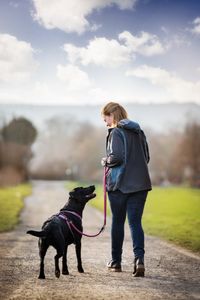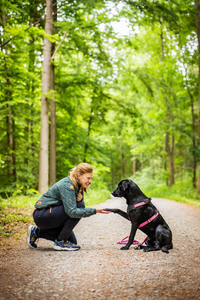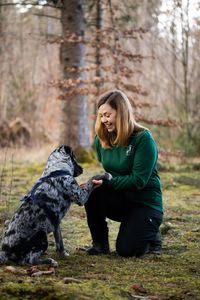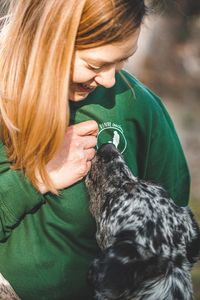My philosophy - non-violent dog training
Non-violent training methods in Kassel and surrounding areas
Together we focus on trust, understanding, loving consistency, respect and refrain from aversive training methods (such as electric/prong collars, leash squeezing, water spraying). We intercept the behavior that is positive for us and reinforce it before your dog shows any other behavior. Of course, we set limits, which can be done without physical intervention.
It is very important to me to respond to you personally, so you will not find a ready-made, generalized concept with me. We will look at your challenge together and find a solution. Among other things, I will provide you with knowledge about your dog, for example, how canine communication and positive reinforcement.
Our philosophy is based on the concept of positive reinforcement. This means that we only work with reward-based methods and strictly reject any form of violence. In our training, we specifically intercept the desired behavior of your dog and reward it so that your four-legged friend automatically shows the behavior you want more often. These rewards can be in the form of food, but also through active play or other activities that your dog appreciates.
The aim of our work is to build a trusting and respectful relationship between you and your dog.
A happy dog is one that lives in an environment that meets its physical, emotional and social needs.
This includes:
- Health and well-being: A happy dog is physically healthy, well-fed and gets enough exercise. Regular vet visits and a balanced diet are crucial to ensuring well-being.
- Safety and trust: A dog that feels safe and has a stable environment in which it does not have to be afraid is happier. This also includes the dog perceiving its owner as a reliable and loving partner.
- Social interaction: Dogs are social creatures who need contact with people and other dogs. Regular positive interactions, whether through games, walks or just cuddling, contribute significantly to the dog's happiness.
- Mental stimulation: A happy dog is mentally challenged and has the opportunity to learn new things and explore its surroundings. This can happen through training, toys or even through adventures in nature.
- Love and affection: Dogs need emotional care and loving attention from their humans. A dog that is loved and feels this often shows more joy in life and contentment.
- Freedom from stress and fear: A happy dog lives in an environment that is free from excessive stress, fear and unpleasant stimuli. This also means that it is not raised through violence or harshness, but through understanding and patience.
In short, a happy dog is a dog that feels safe, loved, understood and well cared for. This contentment is reflected in its joy in life, its behavior and its bond with its owner.
It is very important to me to address you personally, so you won't find a ready-made, generalized concept with me. We will look at your challenge together and find a solution. Among other things, I will give you knowledge about your dog, for example how canine communication and positive reinforcement look.



